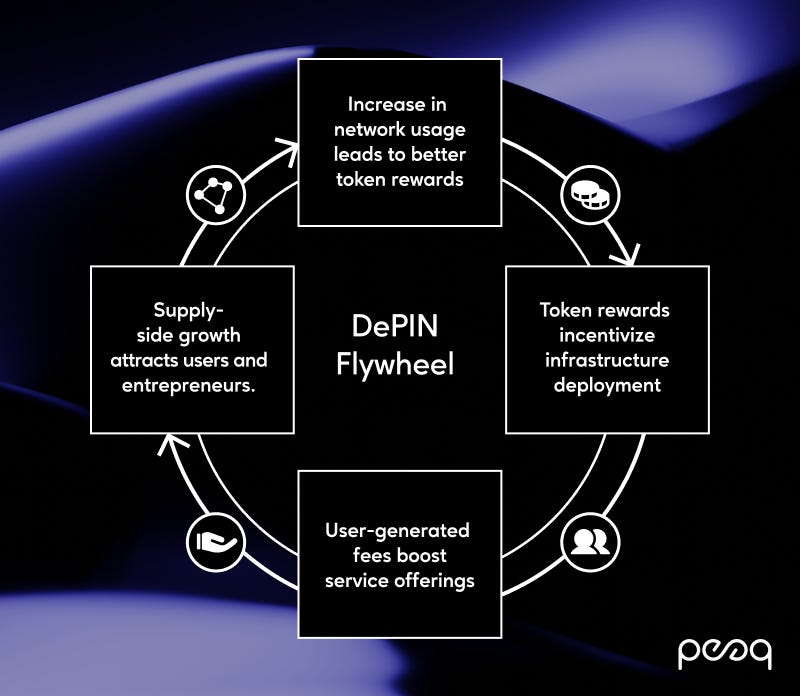The Sharing Economy Reimagined: A Leap Towards Decentralized Marketplaces
How blockchain can be used to bootstrap online resource or physical infrastructure networks to unlock new demand and expand marketplaces in unique ways.
In UETH’s fourth Weekly Workshop, Gleidson Gouva, co-founder of Nosh Delivery, weighed in on:
The extractive nature of Web2 food delivery services and its impact on restaurant owners.
The origin story of Nosh Delivery, a food delivery service cooperative with a Web3 spin that is outperforming corporate titans.
Nosh’s plans to operate as a Decentralized Physical Infrastructure Network (DePIN), which uses blockchain technology to decentralize marketplaces and steer them towards a more balanced model of shared economics
The Extractive Nature of Web2 Corporate Incumbents: A Case Study of Grubhub
When Grubhub took over a local food delivery service in Gleidson Gouvea’s area and hiked commission fees significantly, Gouvea spotted an emerging opportunity. He noted the increasingly extractive nature of traditional Web2 food delivery models in their quest for growth. A case in point is DoorDash, which in 2022 alone funneled an astonishing $1.7 billion – 25.5% of its total revenue – into sales and marketing. This strategy reflects a broader trend in centralized marketplaces entering extractive phases, characterized by Web2 food delivery giants levying hefty 30-40% commission fees on restaurants. These fees are often compounded by hidden charges, labeled as “adjustments,” that arise from customer complaints.
Nosh Delivery: A More Inclusive Approach in the Sharing Economy
In response, Gouvea launched Nosh Delivery in Northern Colorado, a regional contender aiming to revolutionize the food delivery landscape. By leveraging a cooperative model, Nosh allows participating restaurants to invest in the company, thereby holding a stake in its success. This model incentivizes restaurants to drive customer acquisition towards Nosh, eliminating the need for a traditional sales team.
As a result, Nosh can offer superior service at sustainable rates for both the restaurants and itself, contrasting starkly with the non-profitable, marketing-heavy strategies of companies like DoorDash. “Restaurants tell customers to order on Nosh if they want delivery, so Nosh has no sales team,” Gouvea explained. In contrast, incumbents like DoorDash have not shown a profit since its inception in 2013, spending a large portion of its revenue on marketing costs. Nosh's approach has resonated powerfully with restaurant owners, evidenced by 40% of its clientele opting for exclusivity with Nosh – a feat unmatched by incumbent services.
Embracing Blockchain for Scale
As Nosh expanded, Gouvea faced a common startup dilemma: scaling effectively. He needed a solution that could support the complexities of scale, such as allowing him to add hundreds of restaurants in multiple markets, without having to establish complex co-op legal structures in each market.
That’s when blockchain found him. When a restaurant owner suggested Gouvea look into web3 solutions, he was initially skeptical. However, the more he looked into blockchain technology he realized it was the elegant, sophisticated solution he needed. The technology's inherent emphasis on decentralized ownership aligned seamlessly with Nosh’s cooperative principles. Gouvea soon recognized the transformative potential of Web3 for fostering collective ownership and collaboration, thus offering an innovative solution to streamline Nosh’s expansion.
Gouvea imagines a future where the Nosh protocol operates as a network of interconnected cooperatives, unified by a unique token system. This system is designed to reward every participant in the network, extending beyond mere investors. It includes a diverse range of stakeholders such as restaurant owners, employees, delivery drivers, and customers – essentially, anyone who contributes to the network's growth and success. Unlike traditional business models where profits are concentrated among a select few, this approach ensures that the entire community of stakeholders reaps the benefits. By distributing shares and rewards down to the grassroots level – encompassing everyone from restaurant owners to drivers and customers – Nosh ensures that the economic benefits remain within the community.
At its core, this innovative approach is setting the stage for a Decentralized Physical Infrastructure Network (DePIN), pioneering a new way of community-centric business and economic collaboration.
Decentralized Physical Infrastructure Networks (DePIN): Definition and Potential
Decentralized Physical Infrastructure Networks (DePIN) represent a groundbreaking shift in the management and scaling of online resources and physical infrastructure. Central to this innovation is the strategic use of digital tokens and cryptocurrencies, incentivizing stakeholders to engage actively in the development and financing of tangible infrastructure projects. This approach significantly reconfigures the traditional, capital-intensive infrastructure model into more manageable, agile segments. By leveraging blockchain technology, DePINs are at the forefront of decentralizing marketplace systems that are not only more sustainable and adaptable, but also finely attuned to the evolving demands of modern society.
Source: What are Decentralized Physical Infrastructure Networks? (Peaq)
At the heart of DePINs are cryptonetworks, which harness token-based incentives to secure the essential funding and operational liquidity for online resources or tangible physical infrastructure. These networks employ tokens to reduce initial resource costs and aim to ignite new market demands or broaden existing markets in innovative ways. The scope of these networks' applications is extensive and profoundly impactful. A prime example is the case of Nosh, where the team’s protocol design redefines network ownership. The token will systematically provide rewards for various activities, such as referrals, ensuring restaurant exclusivity, and managing substantial transaction volumes.
Cryptocurrency demonstrates its versatility in coordinating an array of decentralized networks, encompassing areas like computing, energy, and data management. For instance, Hivemapper contributes directly by supplying data to transportation companies like Uber, thereby enhancing their mapping capabilities. Similarly, Akash Network is an open-source cloud service provider that lets users buy and sell excess computing resources securely and efficiently. These examples exemplify the expansive reach and potential of crypto in revolutionizing how resources are managed and delivered, making an indelible mark on various sectors.
The Future and Challenges of DePINs
According to Messari Research, the total addressable market for DePINs is estimated to reach $3.5 trillion by 2028, up from the current $2.2 trillion, highlighting the significant growth potential in this sector. DePINs promise a host of advantages including rapid network construction, alignment with local market requirements, cost-efficiency, scalability, and the promotion of collective ownership. These networks facilitate seamless micropayments and are integrated with decentralized finance (DeFi), further broadening their appeal and functionality.
However, the journey of DePINs is not without its challenges. Issues such as potentially dilutive incentive models and the regulatory uncertainties surrounding blockchain technologies present hurdles that need to be navigated. Despite these challenges, the potential of DePINs to revolutionize the management and conception of online and physical infrastructure networks remains immense and transformative, paving the way for a more efficient and equitable future.
Shaping the Future: Web3's Impact on Infrastructure and the Sharing Economy
The maturation of blockchain technology heralds a transformative era for the sharing economy, paving the way for more efficient, decentralized, and fair market alternatives. This technological progression holds the promise of disrupting long-standing practices across various sectors. At the forefront of this change are Decentralized Physical Infrastructure Networks (DePINs), which epitomize a philosophy centered around community and efficiency. These networks are set to redefine numerous industries, steering them towards a more balanced model of shared economics. Entrepreneurs like Gliedson Govea and projects like Nosh are leading this transformation, utilizing Web3 to tackle prevailing economic challenges. Their efforts are crucial in shaping a future that is not only more inclusive but also deeply interconnected within the realms of business and the broader sharing economy.
Get involved
Connect with our expert on X: @GleidsonGo_
Learn more about DePin:



